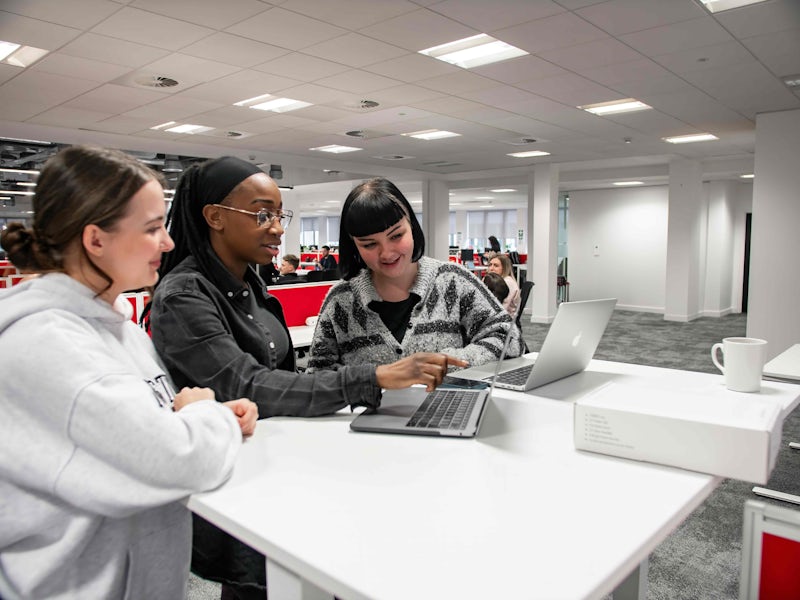Recruitment and Hiring
4 Interpersonal Skills You Should Develop for a Tech Career

Being comfortable working with others and navigating the occasional conflict doesn’t just make your workdays easier—it’s critical for advancing in your career. It can be easy to think that if you show up and write good code, then you’re a good developer and don’t need to think about it any further. However, those who help to move the work forward are the ones promoted, and progress comes from multiple people working in cooperation.
1. Become a Successful Collaborator
When starting out or in a new role, you might be wanting to prove yourself by showing you can complete your work independently. Sometimes a sense of pride and fear of making mistakes can also keep us from sharing something until we feel it’s polished and ready. Instead, it’s important to become comfortable showing your work and bringing your teammates into your process while you’re working on something.
It’s much easier for teammates or your manager to course-correct you while you’re working than if you give them a finished product. When your team understands your approach and how you came to a solution, they can also give productive feedback that helps move the project forward.
The people within your discipline are the ones who will help you level up and support you as you grow, so fostering a collaborative culture is a good place to begin. If there aren’t natural opportunities to collaborate on your current projects, you could suggest pair programming with a more senior teammate.
2. Communicate to Pre-empt Conflict
It’s naturally easier to collaborate within your own team when you speak the same language. You will have shared assumptions or history that help them understand your motivations or the constraints you’re working with. On the other hand, working with other teams with varying levels of technical understanding can be a challenge. Conflicts between departments often arise due to a lack of context. For instance, a software engineer might provide an update they believe is comprehensive, but a designer might not fully understand it because they’re unaware of the trade-offs that had to be made. When partnering with team members from other domains (like design or product), it’s helpful to over-communicate and give more context than you might think necessary.
Saying things explicitly (versus relying on assumed knowledge) is especially important while you’re starting out. It gives you an opportunity to validate your understanding of a project and the company, while giving others a chance to ask questions.
3. Remember That You’re All on the Same Team
Managing the conflicting needs of stakeholders across different departments can feel adversarial. Having a conversation, assuming positive intent, and focusing on creating a mutually beneficial solution is the best way to lead with emotional intelligence and team up on a compromise.
A little empathy goes a long way when you’re negotiating project requirements and timelines with other teams. It’s good to remember that the job isn’t a list of boxes to check or the different steps you take to push code: the job is to build a solution that works. Sometimes we have to take a step back and ask, ‘Why are we actually here?’ and ‘How do we get there?’. Being able to zoom out and remind yourself that you’re all ultimately working towards the same goal can help you understand each other’s intentions and keep open minds.
4. Practise Active Listening
Active listening is a skill that helps you interpret spoken and unspoken communication, even in tense or uncomfortable situations. Active listening involves tuning into people’s thoughts and feelings and helping them to express themselves through thoughtful reflection and questions.
This technique helps you understand your teammates better and become someone people seek out for collaboration. Put your new skills into practice the next time you have a meeting or video call. You can even practise active listening remotely and in written communication—if anything, this can be easier because asynchronous communication gives you more time to read and digest what someone is saying before responding.
How to Improve Your Interpersonal Skills
Working on these interpersonal skills is something you want to take on proactively— rather than only in response to a sticky situation. The fact that you’re even reading this article is a great first step! Pay attention to the skills you want to develop and notice when you’re falling into old habits. Here are two more ways to take ownership of your development:
1. Connect with People from Different Departments
When you start a new role, work on building up your network. Talk to at least one person from every single team, including Sales, Customer Success, and the Executive team. That way, when you’re in conversations, you already know where they’re coming from and what matters to them, making it easier to be flexible and find compromises for everyone in the room.
2. Work with Your Team Leader on a Development Plan
Have an open conversation with your manager to say that this is an area where you want to grow. They can then give you feedback and the support you need. If your team leader isn’t meeting you halfway, be proactive and state your needs.
Push Your Tech Career Forward with Northcoders Skills Bootcamp
Developing strong interpersonal skills is crucial for advancing in your tech career. At Northcoders, we understand the importance of these skills in complementing your technical expertise. Join our skills bootcamp to learn web development, software development, front-end development, and more. With our coding bootcamp, you'll gain the technical and interpersonal skills needed to succeed in a tech career. Take the first step and learn to code with Northcoders today!

Betty Burrell
Marketing Manager


